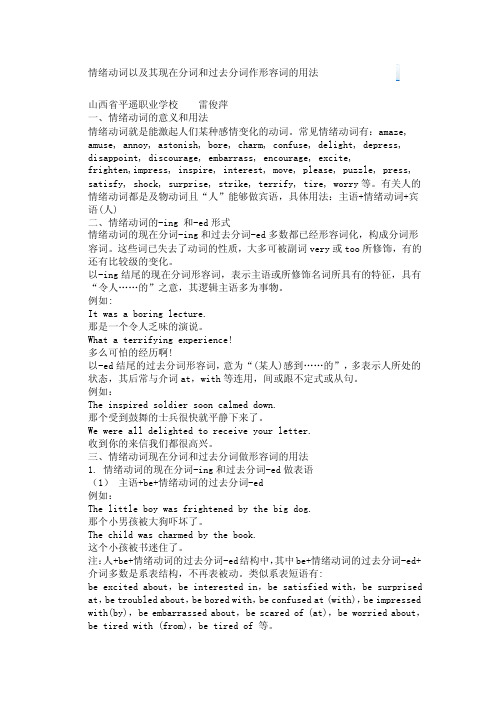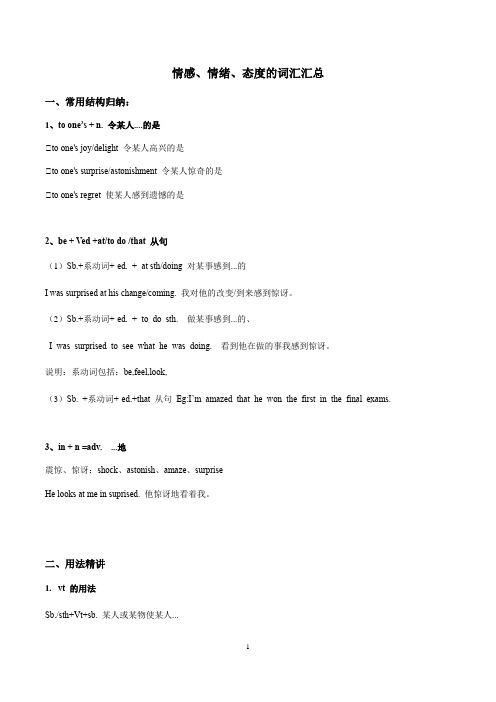情绪动词、关系代名词、形容词句子
初中英语语法 形容词在修饰情感时有哪些常用词汇

初中英语语法形容词在修饰情感时有哪些常用词汇初中英语语法知识点:形容词在修饰情感时的常用词汇形容词在修饰情感时,可以用一些常用的词汇来表达不同的情感。
以下是一些常见的形容词,用于描述情感:1. Happy(快乐的)-表示高兴、满足或愉快的情感。
例句:I feel happy when I spend time with my friends.2. Sad(伤心的)-表示悲伤、失望或沮丧的情感。
例句:She felt sad when her pet dog passed away.3. Excited(兴奋的)-表示兴奋、激动或热情的情感。
例句:I am excited about going on vacation next week.4. Nervous(紧张的)-表示紧张、焦虑或不安的情感。
例句:He was nervous before giving a presentation in front of the class.5. Angry(生气的)-表示愤怒、恼火或不满的情感。
例句:She was angry when her brother broke her favorite toy.6. Surprised(惊讶的)-表示惊讶、吃惊或意外的情感。
例句:I was surprised to see my friend at the party.7. Frustrated(沮丧的)-表示沮丧、失望或受挫的情感。
例句:He felt frustrated when he couldn't solve the math problem.8. Confused(困惑的)-表示困惑、迷茫或不理解的情感。
例句:She was confused about the instructions for the assignment.9. Proud(自豪的)-表示自豪、骄傲或得意的情感。
例句:He felt proud of his achievement in the competition.10. Grateful(感激的)-表示感激、感谢或感恩的情感。
英语情绪情感类及物动词

英语情绪情感类及物动词在英语中,情绪情感类的及物动词通常用来表达一个人对某事或某人的情感反应或态度。
以下是一些常用的情绪情感类及物动词及其用法示例:1. Cheer up - 使某人高兴起来- "Don't worry about the test; let's go out for ice cream to cheer you up."2. Amuse - 使某人娱乐或感到有趣- "The comedian's jokes really amused the audience."3. Annoy - 使某人烦恼或生气- "The constant noise from the construction site is really annoying me."4. Astonish - 使某人感到惊讶- "The magician's tricks astonished everyone at the party."5. Bore - 使某人感到无聊- "The lecture on ancient history bored most of the students."6. Confuse - 使某人困惑- "The complex plot of the movie confused many viewers."7. Disappoint - 使某人失望- "The team's loss in the final game disappointed their fans."8. Excite - 使某人兴奋- "The announcement of the new project excited the whole team."9. Frighten - 使某人害怕- "The sudden thunderstorm frightened the children."10. Inspire - 激励或鼓舞某人- "Her story of perseverance inspired many to overcome their challenges."11. Mortify - 使某人感到羞愧或尴尬- "He was mortified when he realized he had spilled coffee on his shirt."12. Sadden - 使某人感到悲伤- "The news of the old friend's passing saddened everyone."13. Shock - 使某人震惊- "The unexpected resignation of the CEO shocked the company."14. Touch - 感动某人- "The heartfelt speech touched the audience deeply."15. Worry - 使某人担心- "The economic downturn is worrying many investors."这些动词在描述情感反应时非常重要,它们帮助我们更准确地表达我们对不同情境的感受。
情绪动词、关系代名词、形容词句子29页PPT

1
0
、
倚
南
窗
以
寄
傲
,
审
容
膝
之
易
安Байду номын сангаас
。
谢谢你的阅读
❖ 知识就是财富 ❖ 丰富你的人生
71、既然我已经踏上这条道路,那么,任何东西都不应妨碍我沿着这条路走下去。——康德 72、家庭成为快乐的种子在外也不致成为障碍物但在旅行之际却是夜间的伴侣。——西塞罗 73、坚持意志伟大的事业需要始终不渝的精神。——伏尔泰 74、路漫漫其修道远,吾将上下而求索。——屈原 75、内外相应,言行相称。——韩非
情绪动词、关系代名词、形容词句子
6
、
露
凝
无
游
氛
,
天
高
风
景
澈
。
7、翩翩新 来燕,双双入我庐 ,先巢故尚在,相 将还旧居。
8
、
吁
嗟
身
后
名
,
于
我
若
浮
烟
。
9、 陶渊 明( 约 365年 —427年 ),字 元亮, (又 一说名 潜,字 渊明 )号五 柳先生 ,私 谥“靖 节”, 东晋 末期南 朝宋初 期诗 人、文 学家、 辞赋 家、散
文 家 。汉 族 ,东 晋 浔阳 柴桑 人 (今 江西 九江 ) 。曾 做过 几 年小 官, 后辞 官 回家 ,从 此 隐居 ,田 园生 活 是陶 渊明 诗 的主 要题 材, 相 关作 品有 《饮 酒 》 、 《 归 园 田 居 》 、 《 桃花 源 记 》 、 《 五 柳先 生 传 》 、 《 归 去来 兮 辞 》 等 。
情绪动词以及其现在分词和过去分词作形容词的用法

情绪动词以及其现在分词和过去分词作形容词的用法山西省平遥职业学校雷俊萍一、情绪动词的意义和用法情绪动词就是能激起人们某种感情变化的动词。
常见情绪动词有:amaze, amuse, annoy, astonish, bore, charm, confuse, delight, depress, disappoint, discourage, embarrass, encourage, excite,frighten,impress, inspire, interest, move, please, puzzle, press, satisfy, shock, surprise, strike, terrify, tire, worry等。
有关人的情绪动词都是及物动词且“人”能够做宾语,具体用法:主语+情绪动词+宾语(人)二、情绪动词的-ing 和-ed形式情绪动词的现在分词-ing和过去分词-ed多数都已经形容词化,构成分词形容词。
这些词已失去了动词的性质,大多可被副词very或too所修饰,有的还有比较级的变化。
以-ing结尾的现在分词形容词,表示主语或所修饰名词所具有的特征,具有“令人……的”之意,其逻辑主语多为事物。
例如:It was a boring lecture.那是一个令人乏味的演说。
What a terrifying experience!多么可怕的经历啊!以-ed结尾的过去分词形容词,意为“(某人)感到……的”,多表示人所处的状态,其后常与介词at,with等连用,间或跟不定式或从句。
例如:The inspired soldier soon calmed down.那个受到鼓舞的士兵很快就平静下来了。
We were all delighted to receive your letter.收到你的来信我们都很高兴。
三、情绪动词现在分词和过去分词做形容词的用法1. 情绪动词的现在分词-ing和过去分词-ed做表语(1)主语+be+情绪动词的过去分词-ed例如:The little boy was frightened by the big dog.那个小男孩被大狗吓坏了。
词性用法知识点总结大全

词性用法知识点总结大全词性指的是词语在句子中所扮演的角色,包括名词、动词、形容词、副词、代词、介词、连词和感叹词等。
了解每种词性的用法对于正确理解句子的结构和表达意思至关重要。
下面将从常见的几种词性出发,对它们的用法进行总结。
名词名词是表示人、事物、地方、抽象概念的词语。
名词可以作为主语、宾语、定语和状语等,根据句子的语法结构不同扮演不同的角色。
名词还可以通过加上不同的后缀来构成复数形式、所有格和名词性从句等。
在文章中,名词可以用来指代另一个词语,起到替代作用。
动词动词是表示动作、状态或者引起变化的词语。
动词有时态、语态、情态、主语和宾语等的变化,根据句子的需要进行变化。
动词可以单独构成句子的谓语,也可以和助动词、情态动词连用构成复合谓语。
动词还有不定式、动名词和分词等的不同形式。
在句子中,动词能够表达句子所要表达的行为或状态。
形容词形容词是表示人、事物的性质、状态或特征的词语。
形容词可以修饰名词或代词,表示它们的性质或特征。
形容词可以通过比较级和最高级构成不同级别的形式,来表示程度和大小的差异。
形容词还可以通过副词的方式修饰动词或其他形容词,表示它们的性质或特征。
副词副词是表示时间、地点、原因、目的、方式或程度的词语。
副词可以修饰动词、形容词或其他副词,表示它们的时间、地点、原因、目的、方式或程度等关系。
副词还可以通过比较级和最高级构成不同级别的形式,来表示程度和大小的差异。
副词还有一些特殊的形式,或者通过否定前缀构成反义词,来表示否定的意思。
代词代词是用来代替名词或名词短语的词语。
代词分为人称代词、物主代词、反身代词、指示代词、疑问代词、关系代词和不定代词等。
代词可以在句子中作为主语、宾语、定语和状语等,根据句子的需要进行变化。
代词在句子中可以用来指代名词或名词短语,起到复述或者省略的作用。
介词介词是用来表示名词或代词与其他词语之间的关系的词语,通常用来表示时间、地点、方向、原因、目的、手段或比较等关系。
高考词汇复习(人教版)---高中阶段所有情绪情感动词及相应考法-word文档资料

高考词汇复习(人教版)---高中阶段所有情绪情感动词及相应考法-v+ed.(自己)感到···的情绪情感v.-v+ing.令(别人)···的1.tire—tired—tiring—tiredness2.shock—shocked—shocking3.frighten—frightened—frightening4.amaze—amazed—amazing—amazement5.excite—excited—exciting—excitement6.exhaust—exhausted—exhausting—exhaustion7.terrify—terrified—terrifying8.satisfy—satisfied—satisfying—satisfaction9.interest—interested—interesting—interest10.amuse—amused—amusing—amusement11.depress—depressed—depressing—depression12.astonish—astonished—astonishing—astonishment13.bore—bored—boring14.embarrass—embarrassed—embarrassing—embarrassment15.relax—relaxed—relaxing—relaxation16.disappoint—disappointed—disappointing—disappointment17.annoy—annoyed—annoying—annoyance18.confuse—confused—confusing—confusion19.threaten—threatened—threatening20.surprise—surprised—surprising21.puzzle—puzzled---puzzling22.worry—worried--worrying高考考法练习1.The _________ (confuse) look on her face suggested that she hadn't quiteunderstood her manager's idea.2.They asked me so many ___ (confuse) questions that I got _______(confuse) at last.3.The children were ___ (tire)after the trip.4.The ___ (tire)trip lasted a whole day.5.The trip made the children ___ (tire).6.The bad weather made the trip ___ (tire).7.Tom’s parents are ___ (tire)at his ___ (tire)results of theexams.8.___ (disappoint)and angry, he left the meeting-room.9.It is ___ (disappoint)that he didn’t pass the examination.10.When hearing the ___ (surprise)news that Michael Jackson passedaway, they were to look at each other.11.He was ___ (worry)about his ___ (worry)son.答案:1.confused2.confusing, confused3.tired4.tiring5.tired6.tiring7.tired, tiring8.disappointed9.disappointing10.surprising11.worried, worrying12.。
含表示情感类的形容词,主谓结构的英语句子

含表示情感类的形容词,主谓结构的英语句子
(原创实用版)
目录
1.情感类形容词在英语中的表达
2.主谓结构的英语句子构成
3.结合情感类形容词构建主谓结构的英语句子
正文
在英语中,情感类形容词用于描述人物或事物的情感状态,可以使句子更具表现力。
这类形容词包括但不限于:happy(快乐的),sad(悲伤的),angry(生气的),excited(兴奋的)等。
主谓结构的英语句子由主语(subject)和谓语(predicate)组成,用于表达一个完整的意思。
为了构建一个具有情感色彩的主谓结构英语句子,我们需要将情感类形容词与主语和谓语动词相结合。
例如,我们可以通过以下方式构建一个描述人物情感状态的英语句子:主语(subject):He(他)
谓语(predicate):is(是)
情感类形容词:happy(快乐的)
结合以上要素,我们可以得出这样一个句子:He is happy.(他很快乐。
)这个句子清晰地传达了人物的情感状态。
同样地,我们可以用其他情感类形容词来描述不同的情感状态,如:主语(subject):She(她)
谓语(predicate):feels(感觉)
情感类形容词:sad(悲伤的)
得出句子:She feels sad.(她感到悲伤。
)
主语(subject):They(他们)
谓语(predicate):get(变得)
情感类形容词:excited(兴奋的)
得出句子:They get excited.(他们变得兴奋。
写作专题提升之情感、情绪、态度的词汇汇总

情感、情绪、态度的词汇汇总一、常用结构归纳:1、to one’s + n. 令某人....的是①to one's joy/delight 令某人高兴的是②to one's surprise/astonishment 令某人惊奇的是③to one's regret 使某人感到遗憾的是2、be + Ved +at/to do /that 从句(1)Sb.+系动词+-ed. + at sth/doing 对某事感到...的I was surprised at his change/coming. 我对他的改变/到来感到惊讶。
(2)Sb.+系动词+-ed. + to do sth. 做某事感到...的、I was surprised to see what he was doing. 看到他在做的事我感到惊讶。
说明:系动词包括:be,feel,look,(3)Sb. +系动词+-ed.+that 从句Eg:I’m amazed that he won the first in the final exams.3、in + n =adv. ...地震惊、惊讶:shock、astonish、amaze、surpriseHe looks at me in suprised. 他惊讶地看着我。
二、用法精讲1.vt 的用法Sb./sth+Vt+sb. 某人或某物使某人...eg: Mary moved us.玛丽使我们感动。
His words embarrassed me.他的话让我很尴尬。
2.vt.→adj.-ed 感到....的,修饰人,句子的主语通常是人(人的表情也用-ed)。
-ing 令人感到....的,修饰物,句子的主语通常是物。
amaze使惊讶→amazing令人惊讶的→amazed惊讶的;感到惊讶的annoy 使生气→annoying令人生气的→annoyed=angry生气的bore 使无聊→boring令人感到无聊的→bored感到无聊的confuse 使糊涂使困惑→confusing令人困惑的;费解的混乱的→confused感到困惑的/糊涂的convince 使确信;使信服→convincing令人信服的;有说服力的→convinced感到信服的disappoint 使失望→disappointing令人失望的→disappointed感到失望的discourage 使泄气;使沮丧→discouraging令人泄气的;灰心的;→discouraged感到泄气的disgust 使厌恶;使憎恶→disgusting令人厌恶的;令人作呕的→disgusted感到厌恶的/憎恶的embarrass 使尴尬→embarrassing令人尴尬的→embarrassed感到尴尬的excite 使兴奋→exciting令人感到兴奋的→excited 兴奋的;感到兴奋的exhaust 使精疲力竭→exhausting令人筋疲力尽的→exhausted感到筋疲力尽的fascinate 使着迷→fascinating令人着迷的→fascinated着迷的frighten 使惊恐使害怕→frightening令人惊恐的;令人害怕的→frightened感到受惊的/害怕的frustrate使灰心;使沮丧;使愤怒→frustrating挫败的,泄气的→frustrated感到挫败的,泄气的interest 使产生兴趣interesting →令人感兴趣的→interested对...感兴趣的move 使感动→moving令人感动的→moved感动的puzzle 使迷惑;使困惑→puzzling使为难的,费解的→puzzled感到迷惑的/困惑的relax 使放松→relaxing令人放松的→relaxed 放松的;感到放松的shock 使震惊→shocking令人震惊的→shocked感到震惊的surprise 使惊讶→surprising令人惊讶的→surprised惊讶的;感到惊讶的thrill 使狂喜;使激动;使极度兴奋→thrilling扣人心弦的;激动人心的→thrilled感到欣喜若狂/非常开心的tire 使疲劳→tiring令人疲劳的→tired感到疲劳的touch 使触动→touching令人触动的→touched触动的worry 使担忧→worrying令人担忧的→worried感到担忧的特殊变化:please→pleasing=pleasant→pleasedscare→scary→scaredsatisfy→satisfying=satisfactory→satisfieddelight使高兴;使愉快;使快乐delightful 令人高兴的delighted 高兴的愉快的(4)Sth makes/keeps sb +-ed. He often makes us interested in his classes.(5)和介词的搭配be surprised/amazed at 对...感到吃惊be embarrassed about/at 对...感到尴尬be excited/thrilled about/at 对....感到激动兴奋be shocked at 对..感到震惊be interested in 对...感兴趣be pleased/happy/satisfied with对....感到高兴满意be tired with/from由于....感到疲倦be exhausted from/with 因...筋疲力尽be fascinated with 对....着迷/动心be delighted with sb./sth 对...感到高兴be disgusted with 对...感到厌恶be annoyed=angry with 对...感到愤怒生气be scared/terrified/afraid/frightened of 对.....感到害怕/恐惧be tired of 对....感到厌倦be tired out/be exhausted 筋疲力尽be bored with 对....感到厌烦be moved/touched by 被...感动be moved/touched to tears 感动得流下了眼泪be deeply moved深深地感动了be relaxed about 对 ....感到放松be shocked by 被...震惊be shocked to do sth.震惊地做某事be worried about =worry about 担心... ,对...感到焦虑/担心be fascinated in/by 被...迷住be delighted for sb.为.。
- 1、下载文档前请自行甄别文档内容的完整性,平台不提供额外的编辑、内容补充、找答案等附加服务。
- 2、"仅部分预览"的文档,不可在线预览部分如存在完整性等问题,可反馈申请退款(可完整预览的文档不适用该条件!)。
- 3、如文档侵犯您的权益,请联系客服反馈,我们会尽快为您处理(人工客服工作时间:9:00-18:30)。
with/about about about of at/by of with with/by about/at about/at 整理ppt
• 句型:主语+be动词 +连缀动词
• 当主语是人,情绪动 词多以 V+ed 呈现。
• 指:某人对某事感 到…
5
• I am excited about our performance. • He is scared of ghost. • Mom is satisfied with our grades. • I am surprised by the way you look
today.
整理ppt
6
• Joe is impressed with you. • He is never worried about you. • I am tired of my job. • She was embarrassed about the fact
that she failed the PE class.
• This is the beautiful house that I used to live in.
• This is the beautiful house I used to live in.
• This is the beautiful house in which I used to live .
整理ppt
3
情绪动词表
interest satisfy
感到有趣 感到满意
surprise scare
感到惊讶 感到害怕
excite tire
感到兴奋 感到疲累
bore
worry
感到无聊 感到担心
整理ppt
4
不同情绪形容词的介系词也不相同
bored excited worried scared surprised tired satisfied impressed embarrassed Interested
• 举例二:interest
• I am interested in this subject.
• This subject is interesting.
整理ppt
8
关系代名词
整理ppt
9
关系代名词
• 功用:具有连接词跟代名词两种功用。
主格→作主 所有格→修 受格→作受
语
饰名词
受
人
Who/that
先行詞就是關係代名詞所替代的名詞。 關係代名詞如:who/ which/ that
整理ppt
16
當需要將兩個句子合而為一時,常 會使用形容詞子句。
• 舉例一: The boy has blue eyes + The boy is playing baseball with Ben
= the boy (who is playing baseball with Ben ) has blue eyes. 其中紅字由who is 帶領的子句即為關係子句, ()中的句子若是丟掉,原句依舊成立。
整理ppt
7
情绪动词的两种用法
• 举例一:bore • I am bored. 我是一个无聊的人 • I am boring. 我觉得现在很无聊 • This book is boring. 这本书令我感到无聊 • The boring boy makes us bored.
这位令人厌烦的人使我们感到厌烦
*情绪动词 *关系代名词 *形容词句子
整理ppt
1
情绪动词
整理ppt
2
情绪动词
意义:用以表现情绪的动词,如『感到…』 的句子。
• 特色:都可以变成情绪形容词,如tired, boring 等。
• 句型: 主主语+be动词+V-ing+to
(某物使某人感到...) 如: That movie is interesting to us. (那部电影节我们感到有趣)
整理ppt
17
• 舉例二: • I want the dress (which you wore at
the party last Friday.) • dress在此句為受詞,which 即可省略。 • ()內即為關係子句。
整理ppt18来自 • 舉例三:• The tall man is my Math teacher. +
• The man’s hair is grey.
= the tall man (whose hair is grey) is my Math teacher.
whose Whom/that
事物、动 物
人+事物/ 动物
沒有先行 詞
Which/that That
Whose Of which
X
that
X
整理ppt
Which/that
That
what
10
以人为先行词举例
• I like the girl who has long hair. • 我喜欢长头发的女孩。 • I like the girl, who has long hair. • 我喜欢长头发的女孩。 • I like the girl whom Josh fell in love
• A我只喜欢一个老师。 • B只要是和善跟聪明的老师我都喜欢。
整理ppt
13
注意!
• that 用于人、事、物各种情況,为受 词时可以省略。
• whom 已经日渐少用。 • where=in which。
整理ppt
14
形容词子句
整理ppt
15
形容詞子句
意義:以關係代名詞所引導的關係子句, 修飾先行詞。
• This is the beautiful house where I used to live.
整理ppt
12
• I like the teacher, who is kind and smart. A
• I like the teacher who is kind and smart. B
with. • I like the girl with whom Josh fell in
love. • 我喜欢Josh曾曾经喜欢过的那位女孩。 • The girl (that) I like is my classmate. • 那位我喜欢的女孩是我的同学。
整理ppt
11
以物為先行詞為例
• This is the beautiful house which I used to live in.
